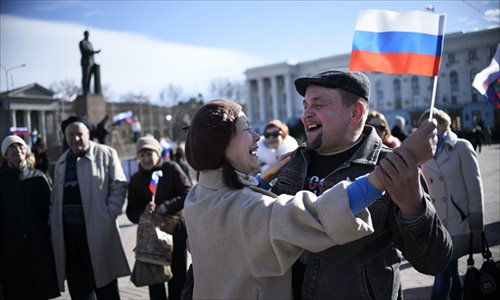HOME >> OP-ED
West-Russia rivalry puts world on edge
Source:Global Times Published: 2014-3-18 1:19:00

A couple dance in celebration in central Simferopol on Monday after Crimea voted to leave Ukraine. The flashpoint peninsula declared independence and applied to join Russia while the Kremlin braced for sanctions. Photo: AFP
The referendum in Crimea on Sunday has laid the legal foundation for Russia to take back this peninsula. The State Duma has said it was willing to accept Crimea's return, but the key figure in this contention, Russian President Vladimir Putin, hasn't given a clear attitude.
Apparently, Putin's ambition is not merely to take another piece of land that makes up less than two-thousandths of Russia's entire territory. He wants the revival of Russia. Moscow believes that the West has been squeezing its strategic space since the fall of the Soviet Union more than 20 years ago, and Russia won't stop it unless it strikes a knockout punch.
So far, no military frictions between major powers have taken place, but the Ukrainian crisis has prompted the West and Russia to reevaluate the other's hostility.
Such an attitude may eventually destroy the basic trust between the two. What's worse, the West's resentment toward Moscow has turned into an animus against Putin, which has closed the door to any possible reconciliation between the two sides.
The West perhaps believes it cannot accept a strategic setback in Ukraine. But defeat in Crimea is even more unacceptable to Russia and Putin. The West should be given a chance to extricate itself from the current situation. Russia is also in need of such a chance, as well as the West's restraint.
Even if Western leaders realize they pushed Russia too hard on Ukraine, it will be difficult for them to readjust their strategies against Moscow. Putin and Moscow are obviously ready for a worst case scenario.
There will not be a new Cold War in Europe, but the worsening of West-Russia relations is unavoidable.
Once the confrontation between the West and Russia goes out of control, it is China that will suffer. Many countries will change their strategies, which will lead to changes to China's external strategic surroundings.
China faces two tasks. The first is to urge all sides not to escalate the situation in Ukraine. It should play a mediating role between the West and Russia and help find opportunities to ease tensions. In the foreseeable future, the West and Russia will be at a crossroads. China's stance toward their confrontation will be key for the world to judge this stalemate.
Second, China must remember the West's embarrassment even when Russia's GDP is not exactly stellar. The final say in a geopolitical competition is military strength.
Having experienced the fall of the Soviet Union and economic slump, Russia still has enough military strength to leave the West in awe.
China should speed up its military modernization, and especially develop its long-range nuclear strike capabilities. The resistance of Moscow this time may stir up the West's interest in evaluating the military strength of big powers. It is more likely that the military strength will be viewed as potential diplomatic leverage. Admittedly, China is relatively weak among major powers in this regard.
Meanwhile, China lacks the experience and courage to confront the West. China should avoid confrontations, but we need to acquire the ability to not fear such a confrontation.
Posted in: Editorial